How might we foster student self-awareness by developing communication skills geared at group work?
At the first F2F, I revised my HMW question a number of times as I sought feedback from @ceby, @amaingot, @gnichols, and @edaigle. My early versions of my HMW question were too wordy and didn’t quite target what I was hoping to achieve but I loved @amaingot‘s suggestion to include the word “foster” when wanting to explore self-awareness.
The definition of foster, according to the Merriam Webster Dictionary, is “to encourage or promote the development of (something, typically something regarded as good).
As a Middle School Drama teacher I certainly see myself as a facilitator and wish to “encourage and promote” self-awareness in my students by building empathy, compassion, patience, understanding, and risk-taking. I find that exploring communication skills during group work, particularly, how students reflect on their performance based work and the feedback they offer their peers, has opened up a discussion of self-awareness in a way that is new to both the students and myself.
My action plan began before I realized I was working on my plan. At the beginning of the year, I asked students to shape their ideal learning journey. I gave them the curriculum expectations and asked them what they might explore in a perfect drama class. I used their feedback to shape the activities we have been working on with a focus on fostering their self-awareness.
The Grade 8’s enjoyed a risk-taking unit they completed in Grade 7 Drama that had them explore group work through creating the ultimate lip sync battle. Students wanted another shot at the task in Grade 8 with the added challenge of performing a lip sync performance that demonstrates a commitment to character in a limit of 5 classes of rehearsal (they had most of the first term last year). They wanted to challenge themselves to use their time efficiently and to improve how they communicated in a group setting to correct the mistakes they made when faced with a similar task the year before.
The opportunity to explore communication during group work to foster self-awareness began when students co-constructed criteria in pairs and then shared their learning with the class. They were able to identify what effective communication would look like, feel like and sound like so I left these criteria up on the wall for each class to refer to as a check throughout the process. Students also set goals for success each class that connected to specific criteria being explored during the lesson. As their exit tickets, students used FlipGrid to orally reflect on whether they met their personal goals and set next steps for success.
To promote positive communication during the feedback cycle, I applied my NSRF coaching certification (August 2018) by creating a poster based on NSRF protocols. Students referred to the poster which helped to promote guided and focussed language around how to provide feedback in such a subjective subject.
I’m currently exploring a variety of strategies and am excited to continue discussions with STARTSole to look at how to continue this learning journey into my Storytelling unit. I have tried to create and model for my students the revision process. The poster, the rubrics, even the lessons, I have sought feedback from my colleagues and students along the way. Have I made mistakes and would I change lessons or my approach in future iterations of the lessons? Absolutely! I’ve ended many classes by having my students and I express our appreciation for something in the lesson. Student’s often reflect on how they’ve valued the feedback from their peers and have appreciated that the drama room is a safe space.
I’m in the middle of my action plan and we often have viewing parties in class to watch and celebrate student performances as well as student rehearsals. We’ll listen to what’s being said and also what’s being communicated in body language. The students are constantly revising their approach and what I find most exciting is that they’ve inspired me to do the same!
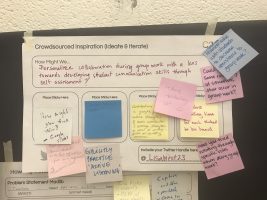
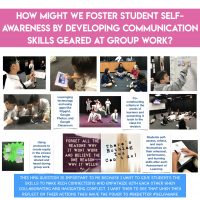
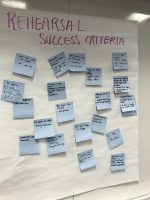
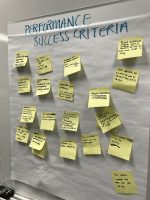
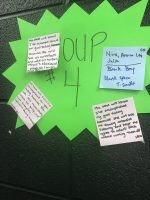
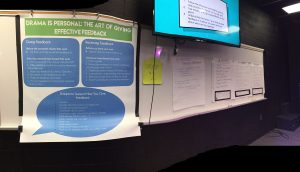
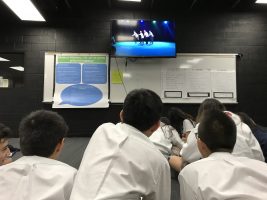
@lwest,
I love your commitment to best practice here: visual learning, voice & choice, success criteria, engaging reflection, tuning protocols. Your students are lucky to have such an engaging and innovative facilitator of learning! As you know, I have personally become quite an advocate of S.O.L.E. (Self Organized Learning Environments), especially the simple and direct approach to inquiry as provided by the STARTSole (https://startsole.org/) methodology.
I recently tweaked their 3-Step approach by adding a gradual release of autonomy model. I am now developing a Unit for Grade 10 History that uses the SOLE approach in a very dynamic BINGO-chart method, giving teachers and students freedom of delivery and reception, all heading towards that ultimate goal of autonomy.
I can’t wait to chat with you more this Friday. Well done on documenting your process, and more importantly, sharing this journey with your students!
Eric
@edaigle,
I’d love to pick your brain on Friday about STARTSole as it is the next component of my action plan. The model you posted on twitter is a great foundation that got me thinking about personalizing goal setting and assessment. I’m wondering about it’s integration with Google products and also the ability to interact with students who are absent due to sports.
@edaigle,
It was great chatting with you on Friday and I’m excited to continue our conversations as I develop a metacognition matrix that compliments your gradual release model. I set a personal deadline for the end of February to try it out.
@lwest
Just, wow! The environment you’ve “fostered” in your classroom with your students is remarkable. It’s incredible how your students are able to influence their own learning journey through familiarizing themselves with the curriculum, co-constructing success criteria, personalizing their learning and pursuing improvement through feedback and iteration.
I would love to see some of this in action and I’m very curious to hear about your rubric since I’m on a journey of rubric redesign.
P.S. kudos for making the drama room a safe space. I imagine that’s the ultimate goal of a drama program, even more so than other classrooms.
@amaingot Check your calendar for an invite! Let’s partner up for our second observation as I have lots to learn from you too! I’m running a feedback class this week on Flipgrid and would welcome your thoughts on the approach.
I love that you are taking Self Awareness and using it to focus on such an important skill! By streamlining your focus- not just in success in your class, but something they can take with them in any class they go into. I wonder what would happen if their co-constructed criteria for effective communication was shared with other teachers who teach them and they held the students to the same expectations when they were doing group work? I love how much you model and hold your self accountable to be transparent with your students! Such awesome inspiration for them to see that learning takes many forms and is in constant motion.
@tfaucher,
Thanks for the feedback! Marisa and I aligned our assessment rubric on attentive listening so the criteria are the same for Drama and French class when oral speaking. Your post got me thinking about personalized learning skills focussed on Division. We could have the students develop success criteria to meet the SEL competencies in alignment with the pillars.
@lwest I think that SEL work is some of the most important work we can do with kids. There are some great resources – https://casel.org/what-is-sel/ and https://casel.org/core-competencies/
Mapping it against your curriculum is a year over year task. I love that you have started this journey. I wonder what other school are doing in this area?
@edaigle @amaingot @lmustard @amacrae
@nblair @mmoore @mbrims @ljensen
@lwest I just got sent this – https://www.edutopia.org/social-emotional-learning
It has some great articles help inform your action plan.
@jmedved,
I reviewed a number of the articles and videos and this quote particularly resonated with me, “Group work can lead to social isolation if a student is perceived to be not equally contributing, so offering opportunities for everyone to participate is important” (Kesty). It stresses the need to create “roles” when scaffolding group work such that students move toward autonomy. This idea has inspired me to create an SEL matrix that will help students determine where they are on their path towards social emotional growth. I was thinking of including some elements on a rubric eg. like attentive listening as I can attach a curriculum expectation to it but otherwise I can use it to speak to the school’s learning skills. I’ve already had students self assess their learning skills and reflect on what they need to do to improve but perhaps I could also leverage Parlay or Flipgrid to engage them in discussion. I wonder what it would be like to run a focussed conversation at the start or end of each week around SEL using one of these tools? Thanks for pushing my thinking!